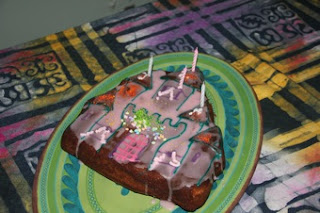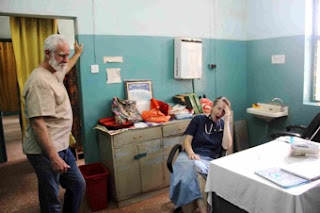I'm writing this last blog post from the comfort of my bed in chilly England. It's good to be home!
The last couple of weeks were filled with the usual level of stress and excitement - I had my last week at the BMC then one week travelling in the south.
On the Monday after my last blog post (16th Sept) I went out with public health for a change of scene. They were doing vaccinations in the local schools, so we stabbed about 600 children that day:
(Sorry this is a bit of a mammoth blog - more like 3 rolled into one due to lack of good internet/time recently)
The last couple of weeks were filled with the usual level of stress and excitement - I had my last week at the BMC then one week travelling in the south.
On the Monday after my last blog post (16th Sept) I went out with public health for a change of scene. They were doing vaccinations in the local schools, so we stabbed about 600 children that day:
Whenever I (or any of the doctors) walk out of the compound we're greeted by shouts of "salminga salminga!" (white person, white person) by all the local children in the village, who come running out to gawp at us. You can imagine the level of excitement then when a salminga went to their schools. I thought at one point I was going to get bundled, but the nurses I was with were very firm and kept shouting at them. Instead they played a game of chicken - who could touch the white girl the longest before getting in trouble.
Despite this they were (as usual) the most well behaved population of children I've ever met when it came to receiving the vaccine. Out of the ~600 kids to be stabbed only about 3 cried, all of which were under the age of 4. The rest came up willingly with their sleeves rolled. I've had grown men faint on me in England from smaller injections than these kiddies were jostling for and grown women cry - shame on you England! Hahahaha
On Thursday Zaato supervised me doing my first circumcision:
Then in majors we had a patient with a massive ovarian cyst. She was about 12 weeks pregnant, but looked term because the cyst was so large. Lisa + Lynn meticulously removed it and let me dissect it afterwards. I won't show pictures of the inside cos it was really gross - we found two teeth, meaning it was a teratoma.
Lisa with the teratoma
Friday was my last day at work and certainly lived up to the usual craziness. After rounds I cut off a melanoma:
(Edit: I wrote this because that's what the doctors in Ghana said it was, but having done 4 months of plastics back in England, I'm pretty sure this isn't a melanoma. Still not sure what it is though!)
(Edit: I wrote this because that's what the doctors in Ghana said it was, but having done 4 months of plastics back in England, I'm pretty sure this isn't a melanoma. Still not sure what it is though!)
Then I went to maternity to check on the 3 labouring women, hoping to catch some babies on my last day. While I was there Michelle came in with a premie baby that had been discharged the previous week. The baby had been doing really well in hospital but the mother was desperate to get home, so Dr Coppola had said she could go on the condition that they came back to clinic on Monday. They didn't show up to clinic until Friday, when the baby was barely breathing, with neonatal sepsis. Michelle and I bagged it for about 2 and a half hours in total, as it had a very poor respiratory effort but a good heart rate. Eventually we decided it was fruitless, as it had fixed and dilated pupils and hadn't improved at all over that time.
But for every death there is new life... shortly after that baby died it was decided two of the labouring women needed C-sections so I got to scrub in on one of them and help bring the healthy screaming baby into the world.
After lunch I said my goodbyes to the nurses and then finally got to clinic.
Paeds nurses (sadly Matthew insisted on taking the photo)
Me and Zaato
On Saturday I left for Accra. I spent 4 days living with a Ghanaian family, friends of one of the docs. This was a really fun experience, although I found Accra a massive culture shock coming from the Gu. Nalerigu (where I spent 9 weeks) is in the rural north, where the majority of people are farmers who live in mud huts. On my first day in the capital we went to the largest, most swanky mall I've ever been to in my life. I found it a bit overwhelming. Then we came home to hear the news of the Westgate shopping mall.
On Wednesday I took the bus to Cape Coast, which I had heard was the most beautiful coastline in Ghana. If I'm honest, my first impressions weren't great. The town is pretty run down, full of derelict buildings. It didn't help that when I first arrived the sky was full of dark clouds making the ocean look grey and gloomy.
This building is still used as a church despite only being half build and half collapsed.
But then the clouds cleared and the sun came out and I could see, on the coast at any rate, why it was classed as being one of Ghana's beauties.
In the mornings the local fisherman can be seen pulling in their nets along the beach
I met a load of other travellers there, mostly from Germany, who were all really friendly. Almost everyone had been there for work placements like me or volunteering. It seems Ghana has very few (pure) tourists.
Me and Neele - a German medical student who'd been on her elective in Accra
On Friday I went to the Cape Coast slave castle - a slightly surreal experience. The castle was used to store captured slaves before being shipped across the Atlantic.
This is the 'door of no return' - all the slaves would pass through here to leave the castle to get onto the slave ships, never to be seen again
In the afternoon I met up with Michelle who'd just finished her month at the BMC. She very kindly let me share her room at a fancy hotel in Elmina for the night. When we got there, looking rather bedraggled, they asked if we'd come to use the pool (you can pay 10 cedi just to use the pool for the day). They looked a bit shocked when she produced a room reservation - I don't think we fitted in with their usual clientele of smart businessmen!
Getting home wasn't too stressful, except for a few minutes at immigration in Accra. Turns out my visa expired 2 weeks ago... at least I bought a 3 month visa but when I arrived in Ghana they'd written (illegibly) 60 days on it. Since no one told me and it clearly said 3 months on the original, it didn't occur to me that it might not last that long. For a few minutes I was worried they might not let me fly, but turns out I just had to pay a fine. Since I only had 10 cedis left on me (about £3) that's all I paid.
So finally I made it home after a long and stressful 10 weeks, but also incredibly rewarding, beyond my expectations. In that time I saw many children die, many get born, did many procedures a lot of junior docs haven't done and held more responsibility than I ever have in my life... not to mention get covered in more bodily fluids than I ever have in my life! But it was an amazing trip and one I'd definitely recommend to anyone currently planning their elective. I definitely plan on going back, hopefully in the not too distant future - hopefully before the current long termers have left! It's been fun writing here, hope you've all enjoyed it =) Looking forward to hearing about everyone else's electives in a couple of weeks!
(Sorry this is a bit of a mammoth blog - more like 3 rolled into one due to lack of good internet/time recently)
























.JPG)



























